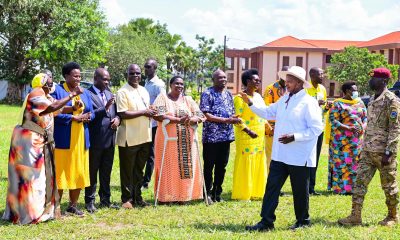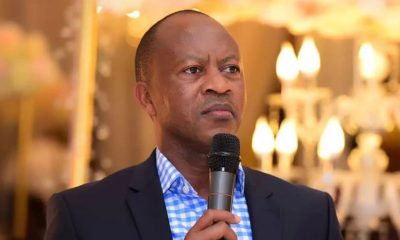Ramathan Ggoobi
Uganda needs a grand property validation exercise to curb corruption
This epidemic remains widespread at all levels of our society
Let’s set up an independent agency to carry out a grand property validation exercise, while sociology is the study of the absence of choice. Economists often want to look at everything that happens around them using economic lenses. I am different. It is perhaps because, apart from the economics that I took as a major, I also earned myself a degree in sociology.
One of the areas where Ugandans seem to have given up for the lack of choice or anything that can be done is corruption. This epidemic remains widespread at all levels of our society, and because of this the country faces major implementation challenges.
Political and economic transformation since the NRM’s assumption of power in 1986 has translated into a period of economic recovery in Uganda. The country experienced one of the highest growth rates in Africa in years gone by until this growth came to a halt about four years ago. The economy is right now in a recession.
Dr. Fred Muhumuza left Ministry of Finance early this year, where he has been senior advisor to the Minister. He confirmed what I have been writing in these pages for weeks now that our economy is in a recession. He wrote a very revealing piece in local media this week.
Corruption scandals in recent times
Mr. President, most governance indicators show that since the advent of bisanja politics in 2006, corruption in Uganda has become widespread and endemic at all levels of our society. Reports by independent international agencies estimate that more than half the government’s annual budget is lost to corruption each year.
Here is a summary of the biggest scandals we have so far heard about in the last five years: Over $27 million (Shs. 70 billion) meant to organise the 2007 CHOGM in Kampala was stolen. In 2008, $10 million (Shs. 26 billion) of global fund to fight malaria, aids, and TB was stolen, although some sources put the figure at $37 (Shs. 96 billion). Another $4.6 million (Shs. 12 billion) were lost in the GAVI immunisation scam.
In July 2008, some Shs. 11 billion of Workers’ Fund at the NSSF were lost in the infamous Temangalo scandal. In the same year, investigation into the Ministry of Works discovered that over $20 million (Shs. 52 billion) meant to finance three projects (the 54km Pakwach – Nebbi road; the 76km Nebbi – Arua road; and the 98km Kabale – Kisoro road) had been stolen.
In early 2010, Shs. 19 billion meant to print National IDs were stolen. A year later, another $1.7 million (about Shs. 4 billion) supposed to supply 70,000 bicycles for LCs, were stolen. Shortly after, we got the news that another Ushs. 60 billion had gone missing from Microfinance Support Centre. As the year was closing, a whopping Shs. 169 billion were reported to have been ‘erroneously’ issued to NRM’s Entrepreneur League Chairman, Hassan Basajjabalaba.
Then in 2012 we learnt that another Shs. 169 billion meant to clear outstanding pension claims of 1,018 former East African Community workers had been stolen. Finally, a reported Shs. 50 billion was early last year lost in the Office of the Prime Minister (OPM) scandal. Undoubtedly another multi-billion scandal is in the pipeline.
Forms of corruption in Uganda
Public confidence in government has been severely affected by these and many other corruption scandals. Year after the other, the World Economic Forum’s Global Competitiveness Reports identify corruption as the major constraints for doing business in Uganda, after access to financing. Small firms and those of middle size often identify corruption as a major or severe constraint to doing business in the country.
Almost all forms of corruption manifest in Uganda — bureaucratic corruption (bribery, nepotism, and misuse of official positions and resources); political corruption (patronage and favouritism –giving jobs and contracts to relatives or supporters of NRM); and corruption in public procurement (a recent World Bank report shows that half of the national budget is spent on procurement deals!).
There is also corruption in tax collection and administration (political interference, patronage, corruption at managerial level and tax collectors openly demanding bribes from taxpayers). There is corruption in the police, perceived as one of the most corrupt institutions in Uganda, particularly traffic police.
Judicial corruption is also rampant. Surveys by Afro-Barometer show that majority of Ugandans think judges and magistrates are involved in corruption, and that high level officials and the rich members of society are significantly less likely to be held accountable for serious crimes than ordinary members of the public.
Therefore, there seems to be corruption everywhere and by nearly everybody at all levels of the state. There is also corruption in private sector.
Over the years, government, the civil society and the international community have established legal and institutional frameworks to counter corruption. The Penal Code Act, the Prevention of Corruption Act, the Inspectorate of Government Act, the Public Finance and Accountability Act, the Leadership Code Act, and the Public Prosecution and Disposal of Public Assets Act are some of the long list of major anti-corruption legislations that have been put in place to fight corruption in Uganda.
Failed anti-corruption efforts
Several anti-corruption institutions are also in place — the Inspectorate of Government (IGG), the Directorate of Public Prosecutions (DPP), the Auditor General (AG), the Directorate of Ethics and Integrity (DEI), the Public Procurement and Disposal of Public Assets Authority (PPDA), and the Inter Agency Forum.
Apart from these, there are also non-governmental actors that have taken up the challenge of fighting corruption in Uganda. These include the civil society (the Anti-Corruption Coalition Uganda, an umbrella group of about 70 civil society organisations seeking to curb corruption in Uganda; Transparency International; and Uganda Debt Network), media and several NGOs.
These efforts, however, have yielded limited results, and recent developments raise doubts about the sincerity of government efforts to effectively address corruption. In some cases, government actions and decisions have clearly contradicted national anti-corruption policies.
Mr. President, history has shown us that you are a great friend of the corrupt. Whenever your ministers have been found culpable of corruption you often come out to protect them. One time you wrote in one of your official communications thus, “The money is misused by civil servants who are poorly supervised by senior political leaders.”
You love to vindicate fellow senior politicians as mere “supervisors”, yet many connive with the civil servants under them to steal taxpayers’ money. You also over the years have recycled condemned thieves in government ministries and departments, and even promoted some instead of punishing them.
Speaking at the 47 year independence celebrations at Kololo Airstrip in 2009, you said, “I am not God. I cannot say: Let there be no corruption and there is no corruption.” So since you have come out and conceded that you lost the battle against graft, what can be done to fight this scourge?
What needs to be done?
Uganda needs a grand property validation exercise to curb corruption. We need to answer the following questions: Who owns which property in Uganda? How did they acquire the property? What is the source of income for those who own particular properties? Where are their tax returns?
In the process of answering these questions, we shall be able to achieve two things: Firstly, we shall catch all those who have accumulated wealth by stealing public resources, which the current legal framework has failed to do.
The Leadership Code Act, requires newly appointed government leaders to declare their incomes, assets and liabilities to the IGG and repeat the ritual every two years. It was hoped that by publicly declaring their wealth, leaders would be subjected to public scrutiny and that this would require them to account for the wealth they have acquired. The intention was that once leaders know that their activities are under public scrutiny they would be honest.
This law leaves numerous loopholes that are gladly being exploited by thieves. They can easily under-declare or hide assets while fulfilling this requirement. In the past the IGG failed to enforce this law on a number of leaders.
A different approach should be sought. The State should set up an independent agency to carry out a census of all properties in the country and also establish the ownership of each property. The owners must then account, with documentary evidence, how they acquired that wealth.
The difference between what is being done now and my proposal is subtle but critical. In the proposed approach, no one will have the opportunity to hide wealth say under relatives or friends through proxy ownership.
Secondly, the proposed approach will also help government to curb tax evasion. The self-declared owners of properties will have to show their tax returns, failure of which should allow URA to fitting fine.
Comments


























